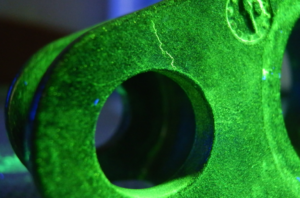“Examine yourselves, to see whether you are in the faith. Test yourselves. Or do you not realize this about yourselves, that Jesus Christ is in you?—unless indeed you fail to meet the test! I hope you will find out that we have not failed the test” (2 Corinthians 13:5-6).
 A machinist who is working to rebuild an automotive engine will often test it for cracks or other irregularities that may lead to failure. This generally involves spreading a fluorescent substance on the surface of an engine block and examining it under an ultraviolet light. This method often reveals issues that are undetectable by other means and allows the machinist to take corrective action.
A machinist who is working to rebuild an automotive engine will often test it for cracks or other irregularities that may lead to failure. This generally involves spreading a fluorescent substance on the surface of an engine block and examining it under an ultraviolet light. This method often reveals issues that are undetectable by other means and allows the machinist to take corrective action.
As we seek to apply the principle behind 2 Corinthians 13:5-6 and prayerfully examine ourselves, here are a few spiritual irregularities we should look for under the “ultraviolet light” of God’s Word…
Ulterior motives. This phrase refers to a rationale that differs from our stated reason for action. A God-honoring person will prayerfully seek to uncover those areas where an actual motive differs from what he or she presents to others (see 1 Corinthians 4:4-5).
Double standards. A double standard can be defined as “the habit of treating one group differently than another when both groups should be treated the same.” (1) The New Testament book of Romans cautions us against establishing such double standards in our evaluation of others (see Romans 2:1-3).
Failure to accept responsibility. The Biblical book of Nehemiah provides us with a good example to follow in chronicling the prayer of those who accepted responsibility for past wrongs (see Nehemiah chapter nine).
Blame shifting. Although human beings have been blame shifting from the beginning (see Genesis 3:11-12), this approach only serves to inhibit the spiritual growth of those in positions of accountability who might otherwise learn from their mistakes.
Lack of perception or discernment. If we seek the Lord for the qualities of perception and discernment, we can often avoid misrepresenting Christ to others or inflicting pain upon those who may be hurt by the potential consequences of our words, actions, and/or decisions (see 1 Corinthians 6:1-8).
Finally, one commentator offers a valuable set of parameters that we can use in this regard…
“Paul asks the Corinthians to examine their own lives for evidence of salvation. Such evidence would include trust in Christ (Heb. 3:6), obedience to God (Matt. 7:21), growth in holiness (Heb. 12:14; 1 John 3:3), the fruit of the Spirit (Gal. 5:22, 23), love for other Christians (1 John 3:14), positive influence on others (Matt. 5:16), adhering to the apostolic teaching (1 John 4:2), and the testimony of the Holy Spirit within them (Rom. 8:15, 16).” (2)
(1) Definition of “double standard” from the Cambridge Academic Content Dictionary © Cambridge University Press https://dictionary.cambridge.org/us/dictionary/english/double-standard
(2) Sproul, R. C. (Ed.). (2015). The Reformation Study Bible: English Standard Version (2015 Edition) (p. 2067). Orlando, FL: Reformation Trust.
Image attribute: By Skleeba [CC BY-SA 4.0 (https://creativecommons.org/licenses/by-sa/4.0)], from Wikimedia Commons https://commons.wikimedia.org/wiki/File:MPI_crack_indication.png

